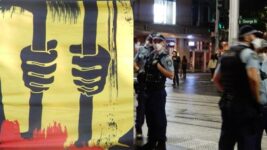Fears Raised as COVID Policing Deployed to Regional First Nations Communities

As the first cases of COVID-19 were detected in western NSW on 11 August, the primary concern was that the highly contagious Delta variant would commence spreading through local First Nations communities that have been identified as “vulnerable” since the pandemic commenced.
There are clear reasons for this vulnerability: the effects of COVID-19 are more detrimental to those with pre-existing conditions, and as there has been no real closing of the gap, Aboriginal people often have chronic health problems, while their regional health services are under-resourced.
By the evening of the 11th, nine local government areas were locked down in the state’s northwest: Walgett, Dubbo, Bogan, Bourke, Brewarrina, Coonamble, Gilgandra, Narromine and Warren. And all of these areas have sizable First Nations communities that continue to have low vaccination rates.
And as the NSW police launched Operation Stay at Home on Monday, concerns have been raised as to whether this heightened approach to COVID policing – which includes no initial warnings for breaches and much steeper fines – will disproportionately affect regional Aboriginal communities.
Zero-tolerance policing
“One of the concerns raised directly to my office from community representatives in far western NSW is the prospect of zero-tolerance policing,” said Greens MLC David Shoebridge, “especially from police who are being shipped in to those communities and aren’t familiar with local residents.”
“It is a fact that many First Nations people do not have up-to-date identification with their current address, or their identification may include only one of a number of addresses that they use,” he told Sydney Criminal Lawyers.
The version currently in force of Public Health (COVID-19 Additional Restrictions for Delta Outbreak) Order 2021 requires a person in NSW to carry identification with proof of address on them whilst outside their home. And a breach of this requirement carries a $1,000 fine.
Another major issue with public health order laws is they’re ever-changing and there’s often a lack of clear messaging notifying the public of any amendments. And this issue is set to be exacerbated as NSW police has announced it’s no longer issuing warnings in regard to breaches.
“There is a real fear that a zero-tolerance policing approach is going to see hundreds – potentially thousands – of First Nations people being fined and prosecuted for breaching public health orders,” Shoebridge warned, “simply because they haven’t got the needed documentation.”
The concern is compounded by police commissioner Mick Fuller’s recent advice to officers to go hard on enforcement, assuring them there will be no consequences for improperly issued fines or court attendance notices.
“I am asking you to put community policing to the side for a short period of time, for 21 days I will head this operation, you need to take a strong approach to enforcement”, the commissioner told members of the force.
“I have said before, if you write a ticket, and you get it wrong, I understand, and I won’t hold you to account for that”, Fuller continued.
Extreme prejudice
The other reason for concern is that the settler colonial state has always, and continues to, subject First Nations peoples to intensified – and often brutal – policing.
Aboriginal and Torres Strait Islander people are stopped by police and subsequently searched, strip searched, arrested, denied bail and imprisoned decidedly more than their non-Indigenous counterparts. And this continues to be the case when it comes to COVID policing.
As UNSW Faculty of Law senior lecturer Dr Vicki Sentas pointed out earlier this month, the Policing Biosecurity paper she and four other researchers produced late last year shows the 2020 pandemic approach in NSW carried this bias.
Sentas explained that NSW police data for the three months to 15 June 2020 shows that despite making up only 3 percent of the state population, First Nations people accounted for 10 percent of people searched following a COVID stop, and 15 percent of those then arrested.
This translated to almost 74 percent of First Nations people who were stopped for COVID reasons being searched, while, in comparison, only 63 percent of non-Indigenous people stopped were then searched.
As for regional communities gearing up for the onslaught of COVID policing, Shoebridge explained that in Walgett, community members are hurriedly trying to get First Nations people temporary memberships at the local club, so they have some form of proof of address to show police.
“If you are found to be travelling without ID on you, you are going to get fined, potentially arrested and there are no more warnings being issued,” the NSW Greens member concluded.







